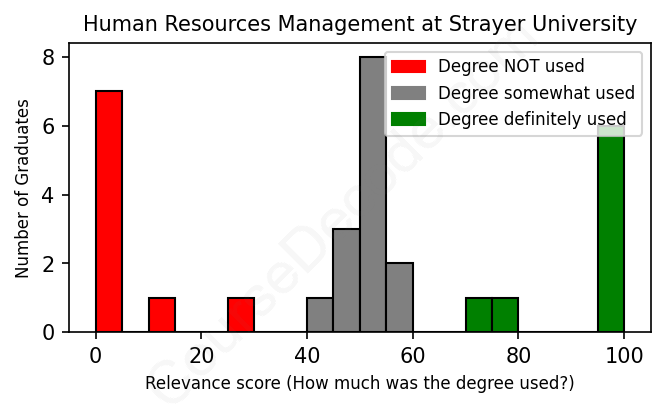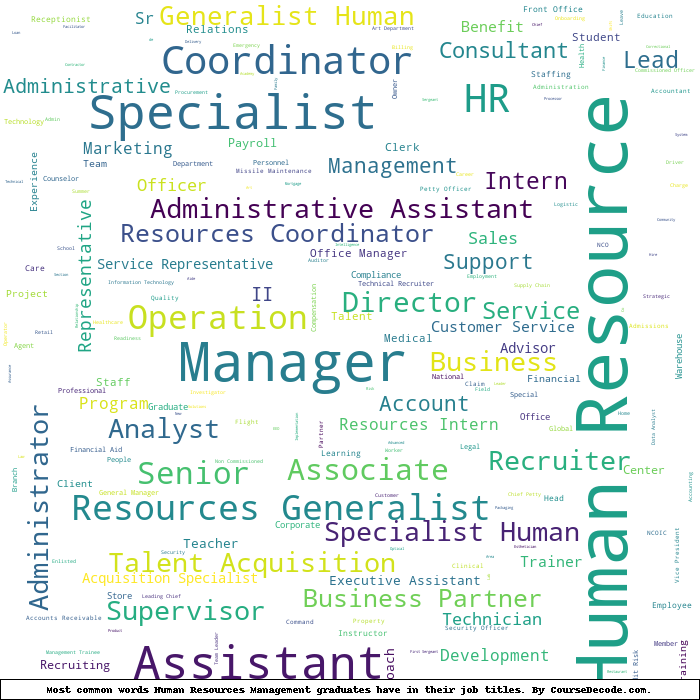
First, some facts. Of the Human Resources Management graduates from Strayer University we've analyzed , here's how many have used (or NOT used) their degree in their career:

These are estimates based on AI analysis of 31 LinkedIn profiles (see below).
The verdict? Significantly below average. Overall, with an average relevance score of 47%, Human Resources Management graduates from Strayer University have a much lower likelihood (-20%) of finding work in this field compared to the average graduate across all fields:
And for comparison, here's the chart for all profiles we've looked at across all degrees.
Also, after graduating, only 16% of these graduates have pursued further education other than another Bachelor's degree (such as a Masters degree or other), compared to the average across all profiles of 35%. This suggests a Bachelors degree is enough for most Human Resources Management graduates, and it's normal to look for work straight after graduation.
See the details:
|
Relevance score: 100% We think this person has gone into a career highly relevant to their degree. We think this person has gone into a career highly relevant to their degree.
DEGREE INFOGraduated in 2013 from Strayer University with a Bachelor's Degree in Human Resources Management. No other secondary education since. JOB HISTORY SINCE GRADUATIONHuman Resources Supervisor TJ Maxx Distribution Center Dec 2016 - Jan 2018 Human Resources Partner  Niki's Int'l Ltd. Jan 2018 - Apr 2021 HR Business Partner II  Amazon Apr 2021 - Aug 2022 HR Manager, ERC  Amazon Aug 2022 - Dec 2022 Human Resources Business Partner  El Paso County, Colorado, USA Apr 2023 - Present ABOUTA dedicated HR professional with over 16 years of proven results and progressive experiences in various areas. My approach is to be a thoughtful leader, a people builder, a compassionate and active listener, a collaborative colleague, and remain enthusiastic about my current and future opportunities. |
The top 10 most common jobs done by the graduates we've analyzed (ranked most common to least) are:
Based on the profiles you provided, it seems that the most common types of jobs pursued by graduates from Strayer University with a degree in Human Resources Management range widely in relevance to the field. Many individuals found roles related to compliance, finance, and operational management, often in positions such as managers, assistants, and coordinators. While some of these roles occasionally utilize HR-related skills—like team management, interpersonal communication, and policy adherence—most do not focus directly on core human resources management responsibilities. Positions like Compliance Specialist and Quality Assurance Analyst show how some graduates have ventured into areas that, while supporting HR principles, are more operational than strategic.
However, there are notable exceptions where alumni have taken on roles that are clearly aligned with HR principles, such as Human Resources Supervisors, Talent Acquisition Specialists, and HR Business Partners. These positions are in line with what you'd expect from a degree in Human Resources Management, revolving around recruitment, employee relations, and organizational development. Overall, it appears that while some grads have found success directly leveraging their HR education, a significant number are navigating through roles that either incorporate minimal HR responsibilities or reside in unrelated fields. This blend of relevance highlights the diverse opportunities available, some more aligned with their studies than others.
Here is a visual representation of the most common words in job titles for Human Resources Management graduates (this is across all Human Resources Management graduates we've analyzed, not just those who went to Strayer University):

Graduates from Strayer University with a degree in Human Resources Management seem to have a pretty diverse range of career paths, and there’s definitely a mix of outcomes. For many, their first jobs after graduation are often in roles that are somewhat tangential to HR, like compliance, customer service, or even positions in finance. This can be common since entry-level HR roles might be competitive, and some graduates take roles that leverage their business skills while they work their way into more HR-focused positions over time. Looking at the first jobs from the profiles you shared, we can see folks stepping into varied roles that may help them develop a strong foundational skill set before moving into more specialized HR positions a few years down the line.
As time goes on, several of these graduates do seem to land roles more directly related to Human Resources. After about five years or so, many have moved up to positions like HR Business Partner or Talent Acquisition Specialist, often at well-known companies. It appears that the longer they stay in the field, the more likely they are to secure good HR-specific roles and leadership positions. There are also examples of some not staying strictly in HR, as a few have branched out into roles in finance or management. Overall, while there are certainly some graduates who might not have taken the path directly linked to HR, many are finding success in relevant careers that likely leverage the skills they learned during their studies at Strayer. So, while it's not a guaranteed straight line to an ideal HR job, there are plenty of graduates who are successfully carving out solid careers in this field over the long haul.
Honestly, getting a Bachelor's degree in Human Resources Management is usually on the easier side compared to some other majors. At Strayer University, which is known for its flexible online programs, you're likely to find classes that are pretty manageable, especially if you stay organized and keep up with your assignments. The coursework often focuses on practical concepts like communication, ethics, and labor laws, which can be interesting and relevant to everyday situations. While some projects and exams can be challenging, most students find the material relatable and applicable, making it a solid choice if you're looking for a degree that you can handle without too much stress.
Most commonly, in the LinkedIn profiles we've looked at, it takes people 3 years to finish a Bachelor degree in Human Resources Management.
Looking at these Strayer University grads, it seems like they’ve had some decent job opportunities overall, but it really varies by individual. The ones working in financial aid or as HR partners at big companies like Amazon or Verizon seem to be on track for good, steady earnings. Meanwhile, some others are in more entry-level positions or roles that might not pay as well, like customer service or part-time gigs. It's a mixed bag—those who climbed the ladder or started in solid positions are likely doing pretty well, while others might be struggling a bit more financially. So, yeah, some are probably making decent money, but others? Not so much!
Here is a visual representation of the most common words seen in the "about" section of LinkedIn profiles who have a Bachelor degree in Human Resources Management (this is across all Human Resources Management graduates we've analyzed, not just those who went to Strayer University). This may or may not be useful:

Here are all colleges offering a Bachelor degree in Human Resources Management (ordered by the average relevance score of their Human Resources Management graduates, best to worst) where we have analyzed at least 10 of their graduates:
| College | Score | Count |
|---|---|---|
 San Jose State University San Jose State University
|
83 | 14 |
 Western Governors University Western Governors University
|
71 | 50 |
 Saint Leo University Saint Leo University
|
71 | 12 |
 Davenport University Davenport University
|
71 | 11 |
 Capella University Capella University
|
70 | 15 |
 Rutgers University Rutgers University
|
67 | 14 |
 Southern New Hampshire University Southern New Hampshire University
|
66 | 30 |
 Lindenwood University Lindenwood University
|
64 | 11 |
 DeVry University DeVry University
|
63 | 31 |
 University of Maryland Global Campus University of Maryland Global Campus
|
61 | 22 |
 Upper Iowa University Upper Iowa University
|
61 | 12 |
 Columbia Southern University Columbia Southern University
|
59 | 28 |
 Central Michigan University Central Michigan University
|
57 | 15 |
 Colorado Technical University Colorado Technical University
|
57 | 16 |
 American InterContinental University American InterContinental University
|
56 | 24 |
 University of Phoenix University of Phoenix
|
55 | 90 |
 Ashford University Ashford University
|
52 | 36 |
 American Military University American Military University
|
52 | 13 |
 Park University Park University
|
52 | 21 |
 University of Maryland University College University of Maryland University College
|
51 | 15 |
 Strayer University Strayer University
|
47 | 31 |